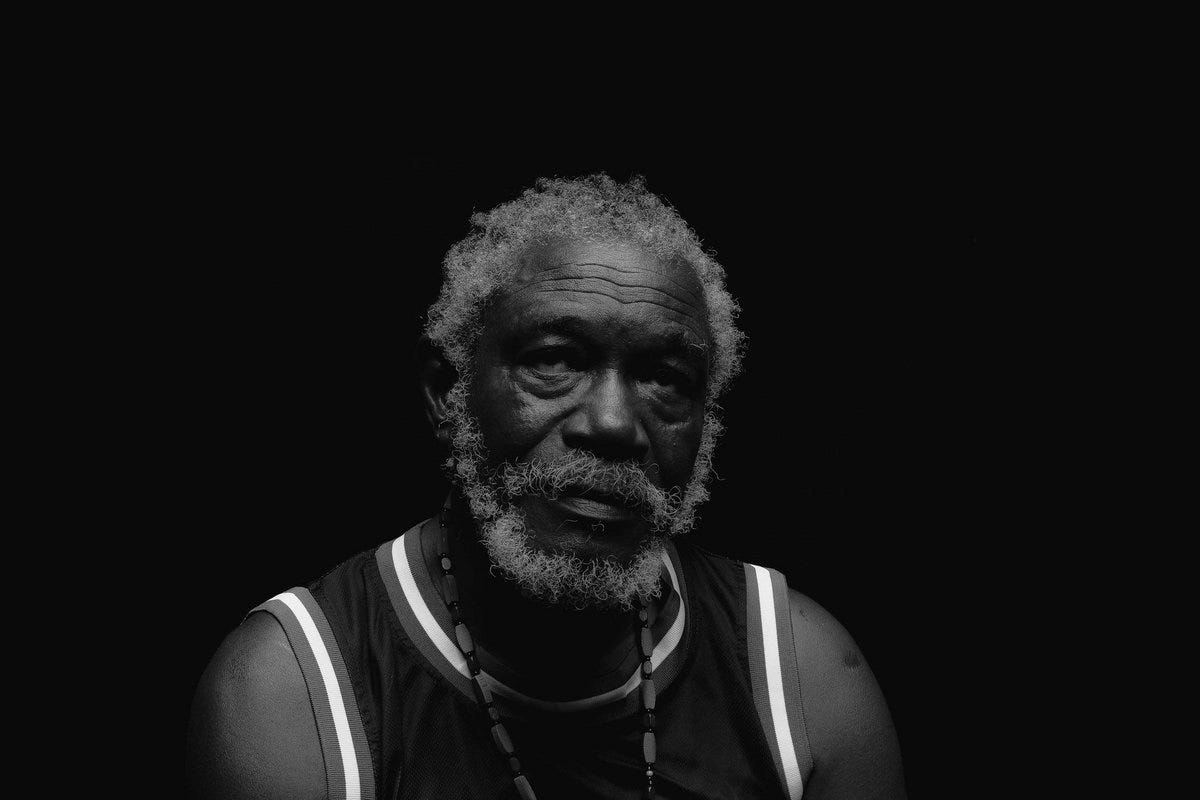Before we begin the main event:
• Work on In the Brewing Luminous: The Life and Music of Cecil Taylor (Wolke Verlag, 2024) proceeds apace. Want to support the project? Patreon. In fact, if you go there now, you can read an excerpt from Chapter 1.
• I wrote a piece on one of the all-time great American indie labels, Fania Records, spotlighting 10 crucial releases, for Bandcamp. Here’s a link.
• Every week, I review a bunch of albums for the Shfl. Last week, I tackled four by Van der Graaf Generator; one by their frontman, Peter Hammill, that’s basically a VdGG album in disguise; and five by the depressive, brilliant, and tragically under-loved Atomic Rooster. Link.
• Hank Shteamer, a friend and colleague, conducted what is almost certainly Jaimie Branch’s final interview. It’s a tremendous piece, very much worth your time. Read it.
Now then:
I don’t really keep up with reggae. I have a few artists whose classic albums I love, first and foremost Burning Spear — his whole late ’60s/early ’70s run (Marcus Garvey, Garvey’s Ghost, Man In The Hills, Dry & Heavy, and Social Living) is stunning, not a wrong step anywhere. A year or two ago, I bought Bob Marley’s Complete Island Recordings box: 11 CDs including all the studio albums and the two main live albums, Live and Babylon By Bus, with a few bonus tracks here and there. (Legend is not included.) I have some Trojan boxes with a bunch of classic ’60s tracks by a wide range of artists. I have best-ofs by Cutty Ranks and Bounty Killer, and while I’m not as besotted by Lee Perry as a lot of my fellow white guys, he’s got a few albums I enjoy. And I’m a big fan of a lot of Adrian Sherwood’s On-U Sound releases; I have a slew of albums by African Head Charge, Dub Syndicate, and Creation Rebel that I listen to on hot days, particularly the latter (if you’ve never heard Starship Africa, fix that right now).
I say all that to certify myself as an enthusiastic dilettante, but someone not exactly up on things, which may help you to contextualize it when I say that when Horace Andy’s Midnight Rocker was released in April of this year, it hit me like a flying mallet. I was only familiar with his voice thanks to his work with Massive Attack, most notably on Mezzanine, where he sang on three tracks, including the astonishing album opener, “Angel”:
Midnight Rocker (as its title may clue you in) contains a version of another Massive Attack song, “Safe From Harm,” which Shara Nelson sang on their debut, Blue Lines. (Andy sang three songs on that disc, and two more on the follow-up, Protection.) But it’s not an electronics-slathered trip-hop album, at least not all the time. Producer Adrian Sherwood drops Andy’s hoarse, only slightly time-faded vocals into a wide range of contexts. “Watch Over Them” has the blown-out quality of classic ’70s dub, the bass swollen to bursting and the drums whacking at your eardrums like a ping-pong paddle smacking a leather couch as a one-finger piano picks out the melody and a synth whines, squeals and ejaculates in echo. Sugary-sweet backing vocals on “Materialist” undercut the starkness that powers the album’s best tracks; this is no sepia-toned Rick Rubin/Johnny Cash canonization project, and Andy is no prophet, despite the desperate cry of the opening “This Must Be Hell.” (Buy Midnight Rocker.)
So that record’s been out since April, and I listened to it all summer. Now there’s a companion volume. Midnight Scorchers (buy it) features guest appearances from ragga vocalists Lone Ranger and Daddy Freddy, radical dub remixes of tracks from Midnight Rocker, and outtakes from the album sessions. It opens with “Come After Midnight,” a psychedelically weaving reworking of “Try Love” from the first album that drops mournful strings into a bottomless well of echoing, tick-and-boom groove. “Midnight Scorcher” is a reworking of “Safe From Harm” that features Daddy Freddy, whose voice has thrilled me since I heard “Ragamuffin Hip-Hop” in 1987. He shows up again on “Dirty Money Business” and “More Bassy,” the latter a reworking of Midnight Rocker closer “Mr. Bassie.”
There are also some brand-new songs on Midnight Scorchers, including single “Away With the Gun and Knife,” on which synthetic-sounding horns and a weird, almost Kraftwerk-ish vocoder-scatting solo float on a cloud of echo; “Feverish,” a tribute to On-U Sound that lets Sherwood go wild with his palette of lunatic effects; and a stirring cover of Bobby “Blue” Bland’s “Ain’t No Love in the Heart of the City.” I’ve always thought there were only two good versions of this song, Bland’s and Whitesnake’s, but Andy gives it the heartfelt delivery it demands.
Midnight Scorchers is inextricably bonded to Midnight Rocker, but it stands on its own. It’s less emotionally stark than its predecessor, but it’s still definitely late-night music, as its title implies. The bass is amniotic, enveloping, especially on headphones, and Andy’s voice blends in more than on the first record. His James Brown-ish “uhh!”s sometimes feel like he’s yelping in alarm as he’s swallowed up. But you should absolutely hear both. I can’t say “this is some of the best reggae of 2022,” because I don’t know that. They’re the only new reggae albums I’ve heard this year. So all I know for sure is that these two records, on their own and taken together, are amazing.
That’s it for now. See you next week!




